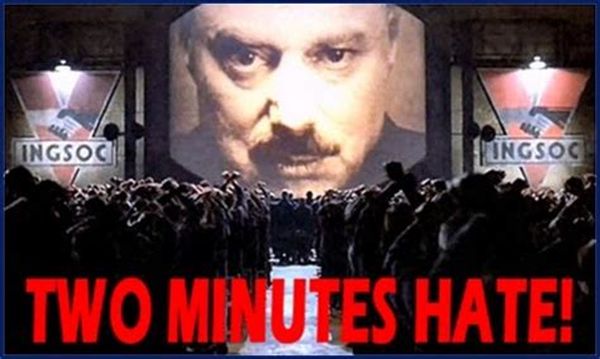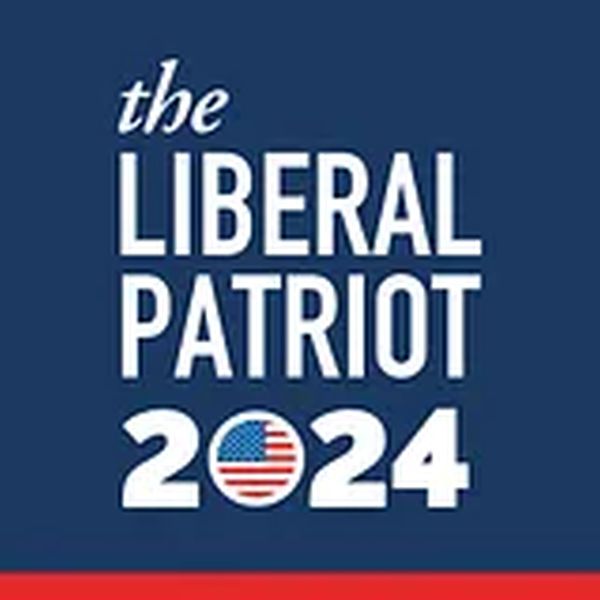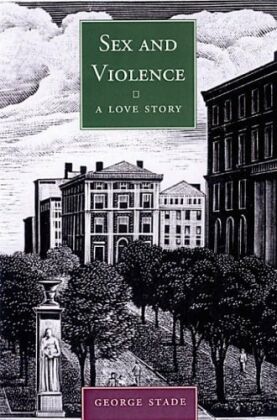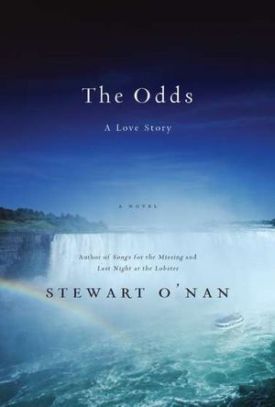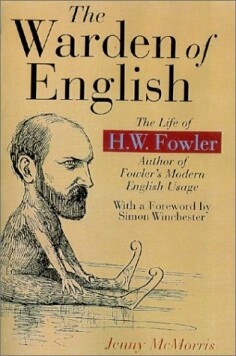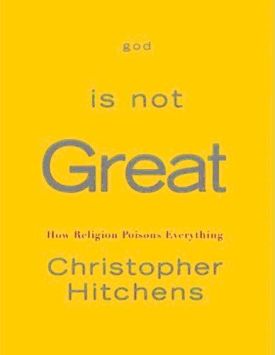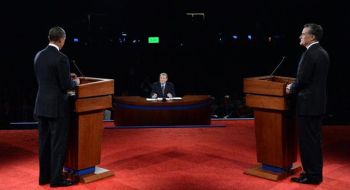Pieces of hate
Not everybody is in despair about the prospect of a Biden-Trump re-match in this year’s presidential election. Here’s J. Peder Zane of RealClearPolitics to the contrary:
Biden vs. Trump appears to be a welcome diversion in a country whose government seems unequipped to face its biggest challenges and whose people are increasingly unwilling to take responsibility for their own problems. Eight months arguing about two angry old men — hearing our own side praise us to the hilt while blaming every woe on the other — is time we don’t have to spend confronting our own difficulties. Historic declines in life expectancy, jaw-dropping rates of obesity, and rising truancy among students are just a few of the ways we the people are running off the rails.
And he goes on to list a number of other statistical indications of anomie and social breakdown, including increasing rates of gambling, addiction, depression, suicide, crime, declining rates of marriage and child-bearing, the armed forces’ recruitment problems and people dropping out of the work force. The list could have been longer. “The government cannot fix most of these problems,” he adds, “which may be why politicians largely ignore them. Such issues must be addressed at that most local of levels – the individual and the family.”
He may be right about this, but I think it is at least worth considering the possibility that, if government can’t fix all these problems, it can make and has made them a lot worse then they would have been otherwise. And if risky, anti-social and non-public spirited behavior has been on the upswing during the three years of the Biden administration, maybe Mr Biden’s proposing himself for re-election against his predecessor in office should be considered as something more than “a welcome diversion.”
But lots of people these days are looking for excuses to regard the election as a diversion, whether welcome or unwelcome, from more serious problems, and the media, down-shifting from apocalypticism to apathy, have apparently made it their business to provide such excuses. That, at any rate, is what I see in their promotion of the idea of the voters lately known as the “double-haters.” According to USA Today/Suffolk University polling, these plague’o’both your houses types number between fifteen and twenty per cent of the electorate. My guess is that they are mostly disillusioned Biden supporters from 2020 who, having failed to get over their hatred of Mr Trump conceived in 2016 and/or 2020, have not found any reason for thinking better of him since.
Now, if you believe the media, they’re sitting in the electoral catbird seat. “Will ‘double haters’ determine the outcome of the 2024 presidential election?” asked Doyle McManus in The Los Angeles Times back in January. In February, the term was picked up by Katie Glueck of The New York Times in a piece headed “Are There Any Persuadable Voters Left?” By March the idea was everywhere. “‘Double haters’ might decide the 2024 election,” wrote Catherine Kim for Politico, while Matt Lewis of The Daily Beast asked “Who Will Win the Biden-Trump Double-Haters?” USA Today invited us to “Meet the surging ‘double haters’ who could decide whether Biden or Trump wins the election,” and ABC News asked “What could sway votes of ‘double haters’ who don’t like Biden, Trump?”
To me, there was a delicious irony in the fact that so many of those who, back in 2016 put up those “No Room for Hate” posters in their windows were now themselves being spoken of by some of their favorite media as “Double Haters” — presumably for finding President Biden as loathsome a character as they once found President Trump to be, but without changing their opinion of the latter. But that last clause is the important one: it’s OK to “hate” President Biden, the media are now prepared to admit, just so long as we don’t on that account forget that we must also hate (sans quotation marks) President Trump.
On the grounds that a measure of honesty about one’s political feelings must always be better than total dishonesty, I’m glad that at least some of the Trump-haters are, unlike Nancy (“I don’t hate anybody”) Pelosi, thus admitting their feelings. But it’s probably too much to hope that this signals a dawning self-awareness on the part of the Trump-haters. I expect them to be more like the present and former leaders of the Scottish National Party who, having admitted to hating all “Tories” proceeded to bring in new and more stringent “hate crime” legislation in Scotland. A lonely Tory in Inverness-shire wrote to the Daily Telegraph to ask wryly if they would now be prosecuting themselves?
The evil of the legislation, however, is not so much that it might occasionally result in an actual prosecution for thought-crime as that, on the mere say-so of a nosy or vindictive neighbor, you can be named on a list kept by Police Scotland of “non-crime hate incidents” — a list that can be consulted by prospective employers or anybody else with an interest in seeking out those who are thus officially branded as wrong-thinkers.
Kathleen Stock writes for UnHerd:
Also accompanying the introduction of the Act has been an infantilising and much-derided publicity campaign, featuring a ginger “Hate Monster” strongly reminiscent of a Sesame Street character, and who is supposed to represent “that feeling some people get when they are frustrated and angry and take it out on others, because they feel like they need to show that they are better than them. In other words, they commit a hate crime.”
Shades of Barack Obama’s “bitter clingers” to their guns and Bibles. It wouldn’t take a whole lot in the way of self-awareness to see how some people might be confused as to who is the real hater is this passage.
Meanwhile, 400 miles to the south at Westminster, the estimable Michael Gove was attempting to deal with political hate by coming up with what he hoped would be a legally enforceable definition of “extremism.” You or I might suppose that hatred itself would do as a rough and ready synonym, but, as everybody knows, certain kinds of hatred are permitted and even encouraged by the impeccably moderate authorities in London — and Washington — as well as Edinburgh. It takes me back to the days, now nearly half a century ago, when Harold Wilson was inveighing against the “extreme so-called moderates” in his own Labour party. For everyone also knows, or ought to know, that there can be no substantive definition of extreme or extremist. It’s just something that you call somebody you hate.
In that it is like “fascist” which, for the real hard-line haters is always preferable to the vaguer “extremist.” A bunch of these extremists have come together to publish a book titled Did It Happen Here? Perspectives on Fascism and America. Andrew Marantz gave it a nearly 5000-word review in The New Yorker which never mentioned the absurdity of the whole enterprise as suggested by the book’s title question. Is it possible, that is — is it even conceivable — for there to have been a fascist government in this or any other country without the country’s knowing it? The tiny sliver of the intellectual elite involved in this volume would presumably say yes, and so discredit themselves — or would if they had the slightest degree of the self-awareness that is the antidote to hate.
You have to try very hard to see in the historical phenomenon called “fascism” from the 1920s and 1930s any but the most accidental real-world relationship to what is going on today. But doing so is just the intellectual’s way of expressing the garden-variety hatred in the media for Mr Trump — as demonstrated by, for example, their wrenching the word “bloodbath” out of its context when Mr Trump suggested that such a sanguinary immersion would be the consequence for the car-making industry of the importation of electric vehicles from China.
Entirely predictably, the Washington Post headlined: “Trump predicts ‘bloodbath’ if he isn’t elected.” Even when reminded of the automotive context of the remark, many of the former president’s many detractors simply disregarded it. “Trump’s call for a ‘bloodbath’ was literal — let’s not waste time pretending it was ambiguous, wrote Amanda Marcotte for Salon, adding a sub-head with an intellectual touch: “Trump hides his threats of fascist violence in plain sight.” Well, there’s plain sight for you. Clearly, only a very single-minded hater could have written that. And she was far from the only one.
It’s hard to see how any fair-minded person could take such obviously biased and disingenuous reporting as a reason for hating someone unless he was convinced in advance of someone’s a priori hatefulness, just as Letitia James was convinced of Mr Trump’s guilt well in advance of having figured out what crime he was supposed to have been guilty of. So there seems to me to be an asymmetry between the hatred directed towards president number 45 and that allegedly facing number 46 — so much so that the use of the same word for both, however convenient for a snappy headline, must be misconceived.
There’s no doubt that the hatred of Mr Trump is hatred indeed — white-hot, burning hatred of a kind that you only see in politics these days, and that only Richard Nixon, of the presidents in living memory, inspired before him. In Mr Biden’s case, it would be more accurate to say that his severest critics feel contempt for him — as someone who is not and never has been what he and his handlers have conspired to represent him as being: moderate, steady, decent, competent. Mr Trump, by contrast, is so authentic that his haters have continually to make things up about him — things like the prospective “bloodbath” — to keep their hatred burning at its accustomed temperature.
The question the pollsters are really asking is which kind of “hatred” is more likely to motivate voters to come out to vote against the more hated of the two candidates? It’s hard to see how either of them can hope to win any converts from the other side — unless, perhaps, as some have speculated the negative coverage of Mr Trump is by now so overdone that even the people it panders to may stop believing in it. More likely, the benefits of double hating will go to third party candidates whom nobody has yet learned to hate. Or to hate so much. And that’s OK with the Los Angeles Times, where Mark Z. Barabak offered a portrait of a woman who “can’t stand Trump or Biden. Don’t tell this ‘double-hater’ she’s crazy voting for someone else.”
Crazy? I don’t think so. She is just one of many nowadays who has something on her mind other than the task of choosing our next national leader. The double haters, after all, were around for a long time before the pollsters came up with this description of them. I remember them telling me back in 2016 and 2020 as they are telling me again in 2024 that they simply won’t stoop to the indignity of voting for either of the candidates with a chance of winning. Admittedly they were all D.C. swamp-dwellers (as am I), and who knows what they actually did or will do in the privacy of the voting booth? But that’s the point. Double-hating, and the media’s celebration of it, is really no more than the latest in elite virtue-signaling: a posture designed for the smug ruling class to feel superior to the people who aren’t smart enough to hate anybody but the smug ruling class.
It always strikes me as remarkable that such people apparently think that anyone outside their little circle of swampy acquaintance cares enough about how they vote or don’t vote to judge them for it. They’re really judging themselves, and finding much to admire as they do. Many of the double haters quoted in the media bring up their chagrin at feeling pressured to choose “the lesser of two evils” — as if this were some uniquely malign stroke of fate against them personally and not the choice that everyone has to make, in every election.
It was of such people, I imagine, that Theodore Roosevelt was thinking when he said that “the poorest way to face life is to face it with a sneer. . .A cynical habit of thought and speech, a readiness to criticize work which the critic himself never tries to perform, an intellectual aloofness which will not accept contact with life’s realities — all these are marks, not … of superiority but of weakness.” These words come from a once-famous address given by the old Bull Moose at the Sorbonne and subsequently referred to by its main character as “The Man in the Arena.”
It is not the critic who counts; not the man who points out how the strong man stumbles, or where the doer of deeds could have done them better. The credit belongs to the man who is actually in the arena, whose face is marred by dust and sweat and blood; who strives valiantly; who errs, who comes short again and again, because there is no effort without error and shortcoming; but who does actually strive to do the deeds; who knows great enthusiasms, the great devotions; who spends himself in a worthy cause; who at the best knows in the end the triumph of high achievement, and who at the worst, if he fails, at least fails while daring greatly, so that his place shall never be with those cold and timid souls who neither know victory nor defeat.
The “cold and timid souls” of the Deep State — which, proclaims a new New York Times video, “Is Actually Kind of Awesome” — have long been intent on the stealthy appropriation for themselves of the prize of political power for which the gladiators of the democratic arena imagine they are contending. That, of course, is another reason for regarding the election as a mere irrelevant diversion, but in a way it may increase our admiration for those who enter the democratic arena anyway.
I wonder which of today’s two contenders TR would have favored? Maybe the one of whom the legal commentator Jonathan Turley wrote: “Dem lawfare puts Trump through hell, but he hardly breaks a sweat.” Likewise, Holman W. Jenkins of The Wall Street Journal has to admit that “Mr. Trump’s cheerful resilience in the face of calumny registers with voters.” Scott McKay of The American Spectator goes so far as to compare the Trump-comeback saga to “the Hero’s Journey” of classic literature. If so, perhaps we should see him as a hero like Goethe’s Götz von Berlichingen in the play of the same name: vulgar, profane, contemptuous of “norms” and established authority but championing unto death national pride and freedom — the word that is on his lips as he dies.
That comparison may be a little too far-fetched to bring many, or indeed any, double haters down from the fence, but I think you’ve got to admit that you must be pretty determined to hate a guy like that.
Discover more from James Bowman
Subscribe to get the latest posts to your email.

